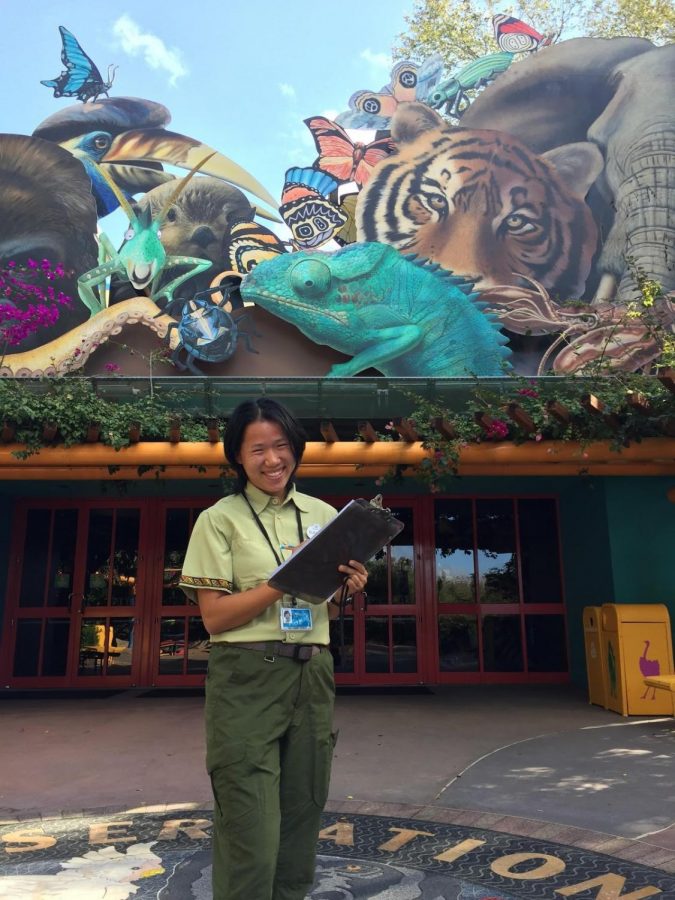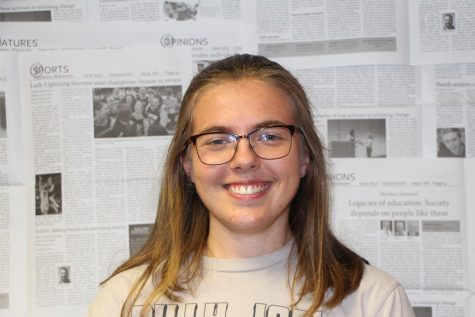Elizabeth Braatz, Class of 2013
March 12, 2018
Elizabeth Braatz is a Butterfly Conservation Technician. She raises Atala butterflies at Walt Disney World to release into the wild. She is also working on a paper about the effect of invasive species on butterfly trends.
Noctiluca: What is your current job? What do you do on a day-to-day basis?
Braatz: I am a Butterfly Conservation Technician employed by Walt Disney World. Gosh, every day is different! Most days I start my day by going to the invertebrate building to help the husbandry team raise Atala butterflies. Atala butterflies are beautiful little velvety black butterflies with flashes of iridescent blue on their wings. They are only about the size of a quarter, and for decades they were thought to be extinct! However, some researchers found a small population in Miami, and now Walt Disney World and partners such as the University of Florida are raising Atala butterflies to release into the wild. We raise them in Orlando, and then we send them down to Disney’s Vero Beach Resort so that kids at the resort can occasionally release them into the wild. I get to focus on feeding the caterpillars, which look like fat little red jolly ranchers with yellow spots.
Another part of my job I really enjoy is science. I regularly conduct surveys of our butterfly gardens so that we can continually improve them, and I also am working on a paper with my boss on how invasive species may be affecting butterfly population trends in Florida.
However, it’s hard to pinpoint everything that goes on; each day is different! Other exciting projects and aspects of my job include giving presentations to various groups, going to scientific conferences to present new research on caterpillar food, and analyzing citizen science data.
N: How has North helped you progress into your job?
B: Two huge things really helped me: classes and clubs. Remember those tough math classes and science classes? They actually help! Even if it can be painful, I found it REALLY paid off (literally) to take as many AP classes and science and math classes as possible in high school. If you’re planning on going to college, every AP class that you take in high school will allow you to take more classes that are specialized to your field of interest. In addition, it saves a ton of money — up to $4,000 per class. That’s a lot of $8/hour shifts at a part time job.
Secondly, I cannot stress enough to get involved in clubs and the teachers who make them possible have been a huge help for me. I want to give a special shoutout to the fantastic Mrs. Delzer (though she was Ms. Sadogierski when I went to school — how time flies!) and Mrs. Stidham-Gebert. Mrs. Delzer and Mrs. Stidham-Gebert ran the environmental club at school, and they went above and beyond as advisors, mentors, and now, friends. Teachers are giving up their own time and energy to give us students these awesome opportunities to actually apply some things we’re learning, so I definitely recommend getting involved. I gave a lot to that club — I was an officer and then president, and I helped organize meetings and volunteering events — but that club and more importantly the people who make it possible gave me so much in return. They taught me about being a leader and organizing events, and those skills got me a lot of internships in college, which in turn eventually led me to my current job. I also got to do super fun things like help with real water science research and go to an environmental camp through that club. So if you’re a current student who likes the environment, next time you’re bored at Homeroom wander on over to a club!
N: What is one piece of advice you would give to students who are currently at North?
B: For you fellow theatre kids out there, especially the techies… I know that you can’t have nice things because you ruin tools really fast. I believe there is a stash of good tools hidden above a ceiling panel in the storage room. I didn’t put it there. Someone else did, but I think they forgot to give them back when they graduated.



